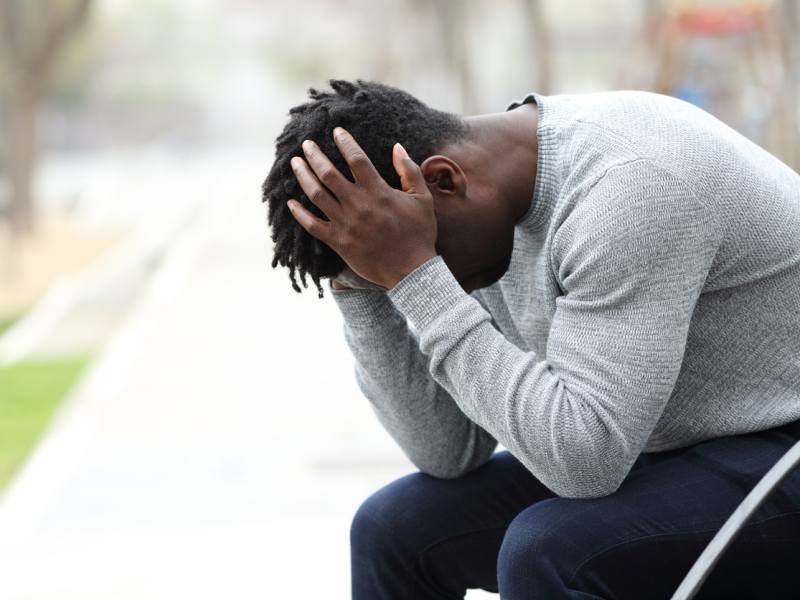
Table of Contents
Can Depression Make You Sick? The Relationship Between Depression and Physical Illness

Written By: Sarah duRivage-Jacobs

Clinically Reviewed By: Dr. Don Gasparini
July 16, 2023
6 min.
The brain-body connection is real: People with depression also often experience physical symptoms. Here’s what we know and don’t know about that relationship.
Learn more about our Clinical Review Process
Table of Contents
According to the Centers for Disease Control and Prevention, in 2021, over 4 in 10 students (42%) who participated in the Youth Risk Behavior Survey reported feeling persistent sadness or hopelessness. This number has increased over time—and these feelings are more prevalent among students from historically marginalized communities.
Persistent sadness and hopelessness are common symptoms of depression, a severe mental health condition with a range of emotional, behavioral, and physical effects. Although people are more commonly aware of the emotional symptoms of depression—such as low mood, less interest in favorite activities, and feelings of guilt or worthlessness—depression can also take a toll on your physical health.
In this article, we’re exploring how and why depression can make people feel physically unwell—and how treatment can help.

Depression treatment designed for you.
Flexible scheduling and personalized care for at-home healing.
The impact of depression on physical health
Uncomfortable physical symptoms are common with depression in adolescence—and they’ve also been associated with adverse childhood experiences like sexual abuse or parental neglect. Adverse childhood experiences can also lead to mental health challenges like depression.
Depression has been linked with many different physical symptoms, including headaches, abdominal pain, fatigue, restlessness, and changes in appetite. For a diagnosis of major depressive disorder, an individual needs to have five or more depressive symptoms most days for two or more weeks.
Persistent depressive disorder is a less severe type of depression, where an individual experiences chronic depressive symptoms for more than a year and possibly some instances of major depressive episodes. People may even seek out treatment for the first time because of these symptoms. Additionally, when experienced in adolescence, physical symptoms may be a predictor of severe mental health challenges in adulthood.
More research is needed before experts fully understand the cause and effect of the relationship between depression and physical symptoms. Here’s what we do know thus far.
Depression and heart disease
Depression has been associated with cardiovascular (heart) disease, but it’s unclear what the exact relationship is. When compared to adults without depression, adults with depression have a higher risk of heart disease. Although we need more research to understand the link, depression is an independent risk factor for heart disease—meaning, on its own, depression is similar to other risk factors like smoking or high blood pressure.
Because depression has been identified as a factor that can predict the likelihood of heart disease later in life, it’s important to monitor young people who have depressive symptoms to help prevent issues down the line.
Depression and cancer
Researchers have long understood that there’s an association between depression and cancer, but, like many of the other relationships covered here, we don’t know all there is to know yet.
A 2020 systematic review and meta-analysis found that both anxiety and depression are associated with a significantly higher cancer incidence, cancer-related death, and death from any cause among people with a cancer diagnosis. These results suggest that depression could be a potential cause of cancer and negative cancer-related outcomes, but researchers said it’s important to interpret the results cautiously because the reviewed studies were often too different in design to draw direct comparisons.
However, the researchers emphasized the importance of identifying and treating depression in people with cancer, as well as the general population.

Depression and chronic pain
Depression and pain have a two-way relationship: Depression can impact pain, and chronic pain can impact mental health. Interestingly, depression and pain have similar underlying biology, making it harder to understand the exact relationship between the two. Depression can also intensify the perception of pain. This means that people with depression may experience more pain and feel that pain more intensely.
If depression and pain are experienced at the same time, treating them both is necessary for feeling better in the mind and body.
Depression and stomach problems
The brain and the gut are interconnected—that’s why nervous stomach aches are a very real thing for many people. What’s more, psychological distress is associated with chronic bowel symptoms. Depression and other psychological factors can actually change how the gastrointestinal tract moves and contracts. Since depression can also make people more sensitive to pain, these gastrointestinal issues may also be felt more intensely. Combining medical treatment for gastrointestinal issues with psychological treatment can result in greater symptom reduction for both conditions.
Depression, energy changes, and sleep problems
Feeling restless or fatigued is common among people who have depression. However, these symptoms can look a little different depending on someone’s age. Younger adolescents may experience restlessness as well as excessive sleepiness, whereas young adults may primarily experience excessive sleepiness. These types of energy changes can lead to difficulty starting and finishing tasks—and the need to sleep during the day.
Energy changes also have a profound impact on sleep patterns at night. Like many other examples in this article, sleep, and mental health have an interconnected relationship. The relationship goes in both directions: People who experience mental health challenges may also struggle with their sleep, and people who have difficulties with sleep may have mental health challenges as a result.
Adolescents with depression may have trouble getting consistent and quality sleep. Sleep problems in the earlier years of adolescence may also predict symptoms and diagnoses of depression and anxiety in later adolescence. Addressing sleep problems when they happen can help prevent related issues, like depression, as time goes on.
Depression and appetite changes
Among adolescents, appetite changes—along with energy changes and sleep problems—are more common presentations of depression than the noticeable mood changes seen in adults. A decrease in appetite is more often seen among children dealing with depression, while an increase in appetite is more often seen among adolescents with depression.
Do you need more support with
your mental health?
Charlie Health can help.
Treating depression and the physical symptoms
Because physical symptoms are a common part of many adolescents’ experiences of depression, treating the depression itself should help with the physical symptoms. According to the American Psychology Association’s Clinical Practice Guideline for treating depression in adolescents, these are the recommended treatments for depression based on current research:
Cognitive behavioral therapy (CBT)
CBT is an evidence-based therapeutic modality that’s recommended for adolescents who have depression. In CBT, an individual’s present problems and symptoms are addressed by identifying and changing unhelpful patterns of behavior, thoughts, and feelings.
Interpersonal psychotherapy for adolescents (IPT-A)
Like its name suggests, IPT-A centers on improving the relationships and circumstances involved in an individual’s depressive episodes. IPT-A is a time-limited therapeutic modality that typically lasts for 12-16 sessions.
Medications
There’s a lot less research investigating medication for depression in adolescents than there is in adults. However, for those who may benefit from it, a selective serotonin reuptake inhibitor (SSRI) called fluoxetine is considered the first-line antidepressant for adolescents.
Supporting your adolescent’s mind and body with Charlie Health
Your child, teen, or young adult deserves to not only feel healthy in their body but also in their mind. If they’re experiencing depression symptoms, there is help available.
Charlie Health’s Intensive Outpatient Program (IOP) offers a combination of effective and sustainable treatments for young people with major depressive disorder and other mental health conditions. Our team of clinicians incorporates elements of CBT, IPT-A, and more evidence-based modalities—depending on your child, teen, or young adult’s needs and preferences. These modalities underpin the individual therapy, family therapy, and support group sessions each client attends on a weekly basis.
Because depression can have a range of impacts on a young person’s life, building out a compassionate care team beyond mental health clinicians may also be a good idea. When specialists across disciplines can connect with one another and share perspectives on a patient’s treatment and progress, care can be as comprehensive as it needs to be. At Charlie Health, we’re committed to helping young people build out a comprehensive care team and can offer referrals to other specialists when helpful.
Interested in finding out Charlie Health could be a good fit for your child, teen, or young adult’s care team? Fill out this short form and learn more today.




